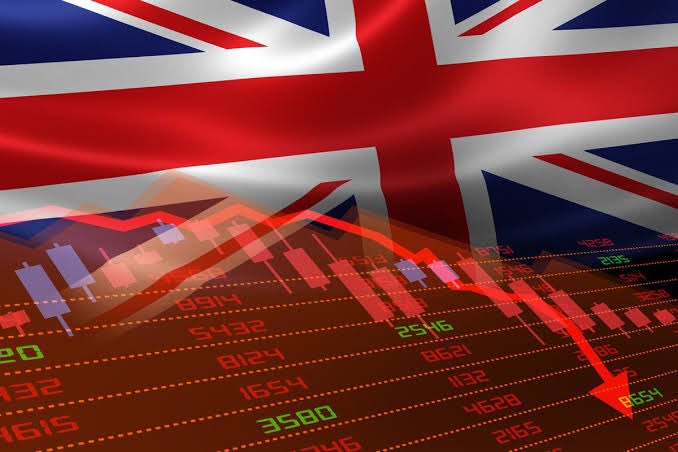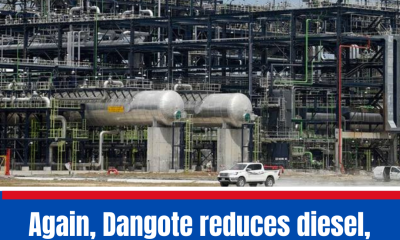Breaking News
BREAKING: UK economy slips into recession

The UK economy has slipped into recession as households cut back on spending in response to soaring interest rates and rising cos of living.
The Office for National Statistics (ONS) said gross domestic product (GDP) fell by a larger than expected 0.3% in the three months to December after a decline in all main sectors of the economy and a collapse in retail sales in the run-up to Christmas.
It followed a drop of 0.1% in the third quarter, confirming a second consecutive quarter of falling national output – the technical definition of a recession.
According to the UK Guardian, the official confirmation of a recession is a blow to the government with an election less than a year away and will embarrass Rishi Sunak, after the prime minister made growing the economy one of his five priorities for government at the start of last year.
Rachel Reeves, the shadow chancellor, said: “Rishi Sunak’s promise to grow the economy is now in tatters. The prime minister can no longer credibly claim that his plan is working or that he has turned the corner on more than 14 years of economic decline under the Conservatives that has left Britain worse off.
“This is Rishi Sunak’s recession, and the news will be deeply worrying for families and business across Britain.”
The ONS said growth over the course of 2023 as a whole was estimated at 0.1%, the weakest year since 2009 during the financial crisis, excluding the economic collapse in 2020 during the Covid pandemic.
The director of economic statistics at the ONS, Liz McKeown, said: “Our initial estimate shows the UK economy contracted in the fourth quarter of 2023. While it has now shrunk for two consecutive quarters, across 2023 as a whole the economy has been broadly flat.
“All the main sectors fell on the quarter, with manufacturing, construction and wholesale being the biggest drags on growth, partially offset by increases in hotels and rentals of vehicles and machinery.”
Economists had widely expected a shallow recession at the end of last year as households came under pressure from higher borrowing costs and rising prices for everyday essentials, forcing cutbacks elsewhere.
Widespread strikes across the economy and heavy rainfall also dampened activity.
More recent snapshots from the economy have, however, shown a rebound in consumer confidence since the start of this year, buoyed up by the prospect of interest rate cuts from the Bank of England as inflationary pressures cool.
Andrew Bailey, the Bank’s governor, this week downplayed the significance of the quarterly GDP figures, suggesting there were signs of an “upturn” in the economy that would become clearer in the months ahead.
The chancellor, Jeremy Hunt, said: “High inflation is the single biggest barrier to growth, which is why halving it has been our top priority. While interest rates are high – so the Bank of England can bring inflation down – low growth is not a surprise.
“But there are signs the British economy is turning a corner. Forecasters agree that growth will strengthen over the next few years, wages are rising faster than prices, mortgage rates are down and unemployment remains low. Although times are still tough for many families, we must stick to the plan – cutting taxes on work and business to build a stronger economy.”
However, the latest snapshot from the ONS indicated weakness across much of the economy at the end of last year, with a fall in GDP amid a tough Christmas shopping period for retailers, strikes by junior doctors, and heavy rainfall.
Reflecting on pressure on household spending amid the cost of living crisis, the ONS said output in the UK’s dominant services sector had fallen for three consecutive quarters, with a drop of 0.2% in the last three months of 2023.
Suren Thiru, the economics director at the Institute of Chartered Accountants in England and Wales, said: “Though the shallowness of this recession provides comfort, these figures also confirm that our economy remained locked in a cycle of persistent stagnation throughout 2023 as a myriad of headwinds, including high inflation, weighed heavily on activity.”
-

 News6 days ago
News6 days agoCourt orders Becky Buodeigha alias Becky Minaj, CEO of BM Secrets to pay Baraza N7m
-

 Politics5 days ago
Politics5 days agoEFCC: I am Ready to Appear in Court But Afraid of Arrest – Yahaya Bello
-

 News1 day ago
News1 day agoYahaya Bello: American International School Of Abuja Has Transferred $760,910.84 To EFCC Out Of $845,852
-

 Politics5 days ago
Politics5 days agoCourt dismisses suit seeking Diri’s disqualification, awards N500,000 Fine
-

 Politics7 days ago
Politics7 days agoEFCC Goes After Malami, Sirika, Farouq-umar Over Multi Fraud
-

 Business5 days ago
Business5 days agoAgain, Dangote reduces diesel, aviation fuel prices to N940, N980
-

 Sports6 days ago
Sports6 days agoSamson Siasia Reveals How Poorly NFF Treats Nigerian Coaches
-

 Politics3 days ago
Politics3 days agoONDO 2024/ Akeredolu’s ex-deputy Agboola wins PDP governorship election primary.




